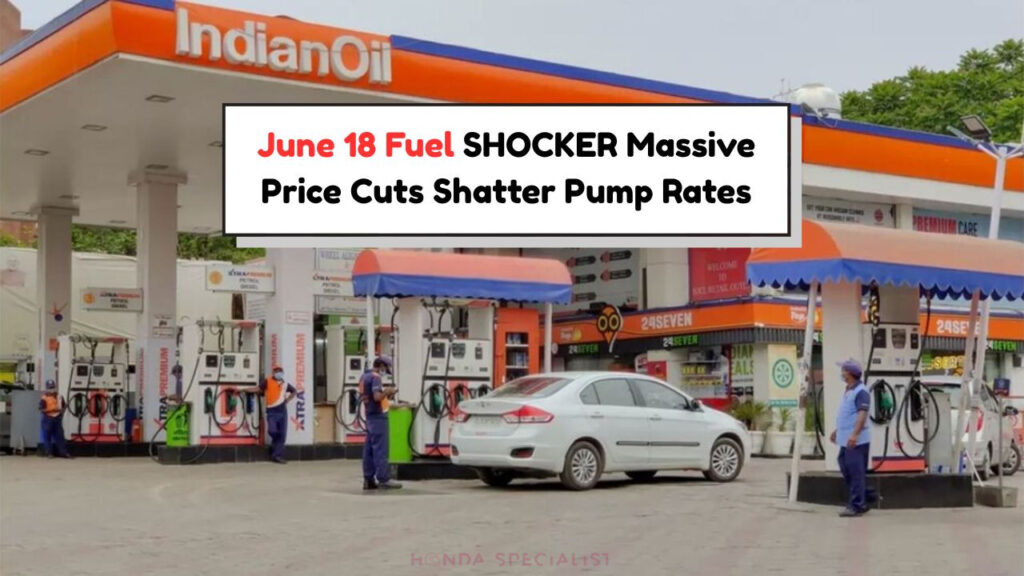
Petrol & Diesel Prices Slashed to ₹75 from 18 June – Discover the New Rates Across All Cities!
Petrol & Diesel Price Cut Brings Relief to Consumers
In a major relief for citizens across India, the government has reduced petrol and diesel prices to ₹75 per litre, effective from 18 June. This decision comes as a welcome move for households and businesses struggling with high fuel expenses. The price cut is expected to ease transportation costs, which may in turn lead to a drop in the cost of goods and services in multiple sectors.
Given India’s dependence on road transport, fluctuations in fuel prices have a significant impact on the economy. With this reduction, daily travelers, logistics providers, and companies are likely to see a noticeable decline in their monthly fuel-related spending. It is also expected to boost overall economic activity by freeing up more money for other consumer expenses.
Effective Date: 18 June
Revised Petrol Price: ₹75 per litre
Revised Diesel Price: ₹75 per litre
Anticipated Impact: Lower transport costs and increased public spending
This timely move is believed to be in response to international crude oil market shifts, aimed at offering immediate support to the public. The government has also committed to maintaining these fuel prices for a stable period, allowing the economy to adapt smoothly.
City-Wise New Petrol & Diesel Rates
The implementation of the new fuel prices will vary slightly across different cities due to local taxes and transportation costs. However, the central government’s mandate ensures that the base price remains ₹75. Citizens can expect minor variations depending on state-level levies and logistical considerations.
| City | Petrol Price | Diesel Price | Variation |
|---|---|---|---|
| Mumbai | ₹75.50 | ₹75.50 | +₹0.50 |
| Delhi | ₹75.00 | ₹75.00 | ₹0.00 |
| Kolkata | ₹75.20 | ₹75.20 | +₹0.20 |
| Chennai | ₹75.30 | ₹75.30 | +₹0.30 |
| Bengaluru | ₹75.40 | ₹75.40 | +₹0.40 |
| Hyderabad | ₹75.25 | ₹75.25 | +₹0.25 |
| Pune | ₹75.10 | ₹75.10 | +₹0.10 |
| Ahmedabad | ₹75.05 | ₹75.05 | +₹0.05 |
While the base price is set at ₹75, the additional charges reflect the varying infrastructural and administrative costs in different states. It’s crucial for consumers to be aware of these minor differences when planning budgets.
Economic Implications of Fuel Price Reduction
The reduction in petrol and diesel prices is not only beneficial for individual consumers but also holds substantial implications for the broader economy. With reduced expenses on fuel, households can allocate more funds to savings or other essential needs, thereby stimulating consumer spending in other sectors. This, in turn, could lead to a boost in economic growth as businesses see increased demand for their products and services.
| Sector | Impact | Expected Change | Notes |
|---|---|---|---|
| Transport | Reduced costs | Increased efficiency | Lower freight charges |
| Agriculture | Lower fuel expenses | Cost-effective logistics | Cheaper produce transportation |
| Manufacturing | Decreased production costs | Enhanced profitability | Lowered overhead costs |
| Retail | Competitive pricing | Higher sales | Improved margins |
| Tourism | More affordable travel | Increased domestic travel | Boost in visitor numbers |
| Logistics | Optimized routes | Cost savings | Improved delivery times |
The price cut is also a strategic initiative to align India’s economic policies with global standards, potentially attracting more foreign investment. By stabilizing the fuel prices, the government aims to create a predictable economic environment that is conducive to both domestic and international business operations.
How Consumers Can Benefit from the Price Drop
- Plan Efficiently: Use the savings from reduced fuel prices to budget for other household expenses or invest in long-term savings plans. Lower fuel costs can free up a significant portion of monthly expenditures, allowing for more financial flexibility.
- Explore Travel Options: With reduced travel costs, families and individuals have the opportunity to explore domestic travel options, which can lead to increased tourism and leisure activities.
- Invest in Fuel-Efficient Vehicles: Consider investing in vehicles that offer better mileage and are more environmentally friendly, further reducing fuel costs and contributing to sustainability.
- Support Local Businesses: Use the additional disposable income to support local businesses, thereby contributing to the local economy and community growth.
- Monitor Market Trends: Stay informed about any future changes in fuel prices to make timely financial decisions and adjustments.
By taking advantage of the reduced fuel prices, consumers can enhance their quality of life while also contributing positively to the economy.
Impact on Small Businesses
The reduction in fuel prices is particularly beneficial for small businesses, which often operate on tight margins and are heavily impacted by fluctuations in operational costs. With fuel being a major expense, the price cut allows these businesses to allocate funds to other critical areas such as marketing, expansion, or technology upgrades. This can lead to enhanced productivity and growth opportunities.
Moreover, reduced fuel costs can also mean lower prices for consumers, positioning small businesses competitively in the market. As they pass on these savings to their customers, it could result in increased customer loyalty and expanded market share.
Challenges and Considerations
While the reduction in fuel prices is largely positive, there are challenges and considerations that need to be addressed. One of the main challenges is ensuring that the benefits of the reduced prices are effectively passed on to consumers and not absorbed by intermediaries. This requires robust monitoring and regulatory mechanisms.
- Monitoring: Ensuring fair pricing practices across states and cities.
- Regulation: Implementing policies to prevent price manipulation.
- Awareness: Educating consumers about their rights regarding price transparency.
Another consideration is the potential environmental impact of increased fuel consumption. While lower prices make fuel more accessible, it’s crucial to balance this with sustainable practices to mitigate environmental consequences.
Anticipated Long-term Effects
| Aspect | Short-term Effect | Long-term Effect |
|---|---|---|
| Consumer Spending | Increased | Sustained growth |
| Business Operations | Reduced costs | Expansion opportunities |
| Economic Growth | Stimulated | Stabilized growth |
| Environmental Impact | Increased fuel use | Need for sustainable practices |
| Government Revenue | Potential shortfall | Needs to adjust fiscal policies |
| Inflation | Temporarily reduced | Controlled inflation rates |
The overall anticipated long-term effects of the price reduction are positive, with potential for significant economic benefits. However, it is essential to approach these changes with a balanced perspective, ensuring that economic growth does not come at an unsustainable environmental cost.
In conclusion, the decision to slash petrol and diesel prices to ₹75 from 18 June marks a pivotal moment for India’s economic landscape, offering widespread benefits and opportunities for growth.
FAQs on Fuel Price Reduction
Why were the petrol and diesel prices reduced?
The reduction was implemented to alleviate the financial burden on consumers and stimulate economic growth by lowering transportation costs.
Will the prices remain at ₹75 permanently?
While the government aims to maintain stable prices, future adjustments may occur based on global oil market trends and economic conditions.
How will this impact daily commuters?
Daily commuters will benefit from reduced travel costs, allowing them to allocate savings to other expenses or savings.
What are the implications for the Indian economy?
The price cut is expected to stimulate consumer spending, reduce operational costs for businesses, and potentially attract foreign investment.
Are there any environmental concerns?
Increased fuel consumption could impact the environment, necessitating a balance between accessibility and sustainability.

